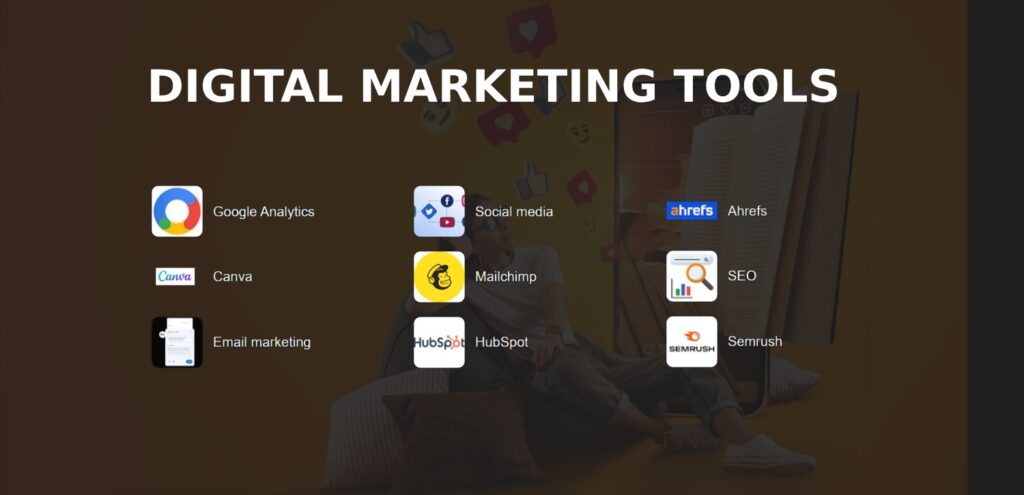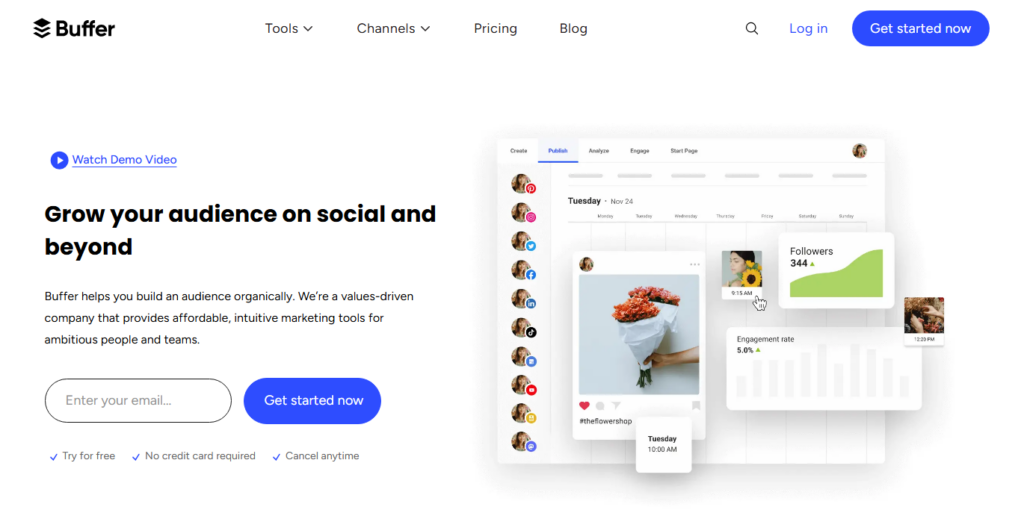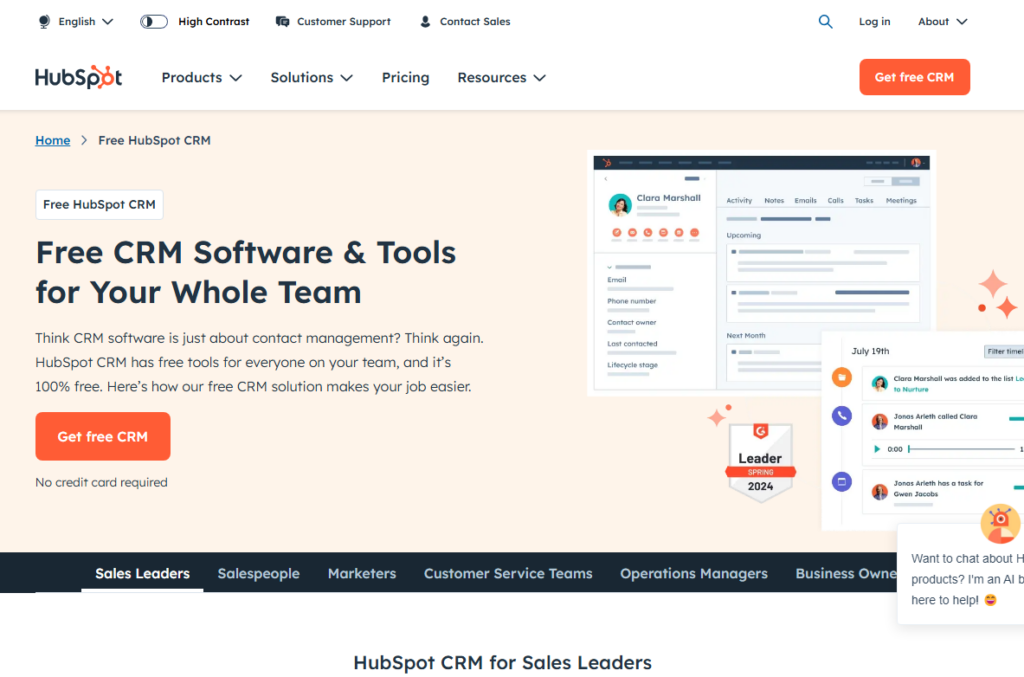In today’s dynamic and technology-driven landscape, Digital Marketing Tools have become indispensable for achieving business success. They are essential for businesses looking to reach their target audience effectively and achieve measurable results. Whether it’s Social Media Marketing, Search Engine Optimization (SEO), or Website Development, these tools streamline processes, provide insights, and enhance productivity. But what exactly are these tools, and how can they revolutionize your digital strategy? This article dives deep into the world of digital marketing tools and their significance.

What Are Digital Marketing Tools?
Digital Marketing Tools are software, platforms, or services designed to help marketers plan, execute, and analyze campaigns across various online channels. These tools serve as the backbone of any digital marketing strategy, providing the necessary features to optimize every aspect of marketing efforts. Let’s break down their key functionalities:
Why Are Digital Marketing Tools Important?
In today’s digital-first landscape, businesses need to stand out. Here’s why digital marketing tools are vital:
- Efficiency: Automating repetitive tasks like social media posting or email scheduling saves valuable time.
- Data-Driven Decisions: With real-time analytics, you can make informed decisions and adjust strategies quickly.
- Cost-Effectiveness: These tools often provide a high return on investment by optimizing your marketing efforts.
- Enhanced Creativity: Tools for graphic design, video editing, and content creation unleash creativity while maintaining professionalism.
Categories of Digital Marketing Tools
1. Social Media Marketing Tools

Social media is a super powerful platform for reaching a huge audience. Popular tools include:
- Hootsuite: Schedule and monitor posts across multiple platforms.
- Canva: Create visually appealing graphics for social media campaigns.
- BuzzSumo: Identify trending topics and content in your niche.
These tools are important for maintaining an engaging social media presence.
2. SEO Tools
Search Engine Optimization (SEO) is super important for driving organic traffic. Here are some top tools:
- SEMrush: Perform keyword research, analyze competitors, and track rankings.
- Ahrefs: Explore backlink opportunities and audit your website.
- Yoast SEO: Optimize on-page SEO for WordPress websites.
Effective use of SEO tools ensures higher visibility on search engine results pages (SERPs).
3. Website Development Tools
Your website is your digital storefront. Tools like:
- WordPress: A user-friendly CMS for creating websites.
- Wix: Drag-and-drop features make website design simple.
- Google Optimize: Test different website layouts to enhance user experience.
A well-designed website enhances credibility and improves user retention.
4. Email Marketing Tools
Email remains a reliable channel for personalized communication. Popular Digital Marketing Tools include:
- Mailchimp: Design and automate email campaigns.
- Constant Contact: Track email metrics like open rates and click-through rates.
- HubSpot: Integrate email campaigns with CRM for better targeting.
Email marketing tools ensure your messages reach the right audience at the right time.
Top Digital Marketing Tools in 2025
Here’s a list of some highly recommended tools for your digital marketing strategy:
1. Hootsuite

- Purpose: Hootsuite is a social media management tool that allows users to manage multiple social media accounts in one place.
- Key Features:
- Schedule posts across most popular social platforms like Facebook, Twitter, LinkedIn, and Instagram.
- Monitor social media activity and mentions in real time.
- Analytics and reporting to track engagement and performance.
- Use: It helps businesses maintain a consistent social media presence by allowing users to pre-schedule content and ensure timely posting across multiple platforms.
2. Buffer

- Purpose: Buffer is another social media management tool that focuses on optimizing social media campaigns through analytics and collaboration.
- Key Features:
- Schedule posts across multiple social media platforms.
- Provides insights into post performance (engagement, clicks, shares).
- Team collaboration tools for approving and managing posts.
- Use: Buffer helps businesses streamline social media campaigns by analyzing content performance and collaborating with teams for more effective posts.
3. Sprout Social
- Purpose: Sprout Social is a social media management tool designed for social listening and customer engagement.
- Key Features:
- Track audience sentiment through social listening (monitoring social media conversations and trends).
- In-depth reporting and analytics on audience behavior and content performance.
- CRM features for managing customer interactions.
- Use: It is especially useful for businesses that want to understand their audience’s needs and sentiments and improve their social media strategy.
4. Canva
- Purpose: Canva is a graphic design tool that simplifies creating professional-quality visuals for non-designers.
- Key Features:
- Drag-and-drop interface to create designs for social media posts, infographics, presentations, and more.
- Pre-designed templates for various formats.
- Access to millions of stock images, fonts, and illustrations.
- Use: It is ideal for businesses that need to create visually appealing content for social media or marketing but do not have a dedicated design team.
5. SEMrush
- Purpose: SEMrush is a comprehensive digital marketing tool primarily used for SEO and competitive analysis.
- Key Features:
- Keyword research to identify terms that can drive organic traffic.
- Competitor analysis to understand the strategies of rivals.
- Site audits to check a website’s SEO health and identify improvement areas.
- Use: SEMrush helps businesses optimize their websites for search engines and stay ahead of the competition by providing data-driven insights.
6. Ahrefs

- Purpose: Ahrefs is a leading SEO Digital Marketing Tools for webmasters, bloggers, and digital marketers.
- Key Features:
- Site audit tool to analyze website health and SEO issues.
- Backlink analysis to understand a site’s link profile.
- Keyword research and rank tracking to monitor keyword performance.
- Use: Ahrefs is used for improving SEO by analyzing competitors, finding backlink opportunities, and tracking keyword rankings.
7. Yoast SEO
- Purpose: Yoast SEO is a popular plugin for WordPress websites that helps optimize on-page SEO.
- Key Features:
- Suggests improvements for meta tags, page titles, and descriptions.
- Analyzes readability and content structure.
- Generates XML sitemaps for search engines to index the website.
- Use: It simplifies the process of optimizing content for search engines on WordPress websites, improving visibility and traffic.
8. Google Search Console
- Purpose: Google Search Console is a Digital Marketing Tools for monitoring and troubleshooting a website’s performance in Google search results.
- Key Features:
- Insights into search queries, impressions, and click-through rates.
- Alerts for site issues like crawl errors or penalties.
- Performance analysis and improvements for SEO.
- Use: It’s essential for webmasters and SEO specialists to understand how their site is performing in search and how to improve visibility.
9. WordPress
- Purpose: WordPress is a content management system (CMS) used to build and manage websites and blogs.
- Key Features:
- Wide selection of themes and templates for various website types.
- Plugins for adding custom functionality (e.g., SEO tools, analytics, security).
- User-friendly content editing interface.
- Use: WordPress powers a significant portion of websites worldwide due to its flexibility, ease of use, and extensive customization options.
10. Wix
- Purpose: Wix is a website builder that allows users to create websites without any coding knowledge.
- Key Features:
- Drag-and-drop website builder with pre-designed templates.
- E-commerce tools for online store management.
- Hosting services included with various pricing plans.
- Use: Wix is perfect for non-technical users who want to build visually appealing websites quickly without coding skills.
11. Google Optimize
- Purpose: Google Optimize is an A/B testing tool that helps businesses test and improve their websites’ performance.
- Key Features:
- Run A/B tests to compare different versions of a webpage.
- Personalize website content based on user segments.
- Integration with Google Analytics for data-driven optimization.
- Use: It helps businesses test different website layouts and strategies to optimize user experience and conversion rates.
12. Mailchimp
- Purpose: Mailchimp is an email marketing platform that helps businesses automate and manage email campaigns.
- Key Features:
- Email campaign creation with customizable templates.
- Marketing automation tools for sending targeted emails based on user behavior.
- Analytics for tracking conversions, click-through rates, and open rates.
- Use: It’s used for building and maintaining email marketing lists, automating campaigns, and analyzing performance.
13. Constant Contact
- Purpose: Constant Contact is another email marketing tool designed for small businesses and nonprofits.
- Key Features:
- Email campaign builder with drag-and-drop functionality.
- List management and segmentation.
- Real-time tracking of email performance (open rates, click rates).
- Use: Ideal for small businesses that need an easy-to-use email marketing platform to engage with customers and analyze results.
14. HubSpot

- Purpose: HubSpot is an all-in-one inbound marketing platform that includes CRM, email marketing, and content management.
- Key Features:
- CRM for managing and nurturing customer relationships.
- Email marketing tools with CRM for personalized email campaigns.
- Analytics and reporting for measuring campaign performance.
- Use: HubSpot is great for businesses looking to automate marketing and sales efforts, with a focus on building customer relationships through personalized campaigns.
15. Google Analytics
- Purpose: Google Analytics is a web analytics service that tracks and reports website traffic.
- Key Features:
- Track website visitors, their behavior, and traffic sources.
- Demographic and geographic information about users.
- Goals and conversion tracking for measuring business objectives.
- Use: It helps businesses understand their website traffic and user behavior to optimize marketing efforts and improve user experience.
These analytics tools ensure that marketing efforts are data-driven and results-oriented.
By leveraging these tools, businesses can save time, enhance efficiency, and achieve better ROI on their marketing efforts.
Features to Look for in Digital Marketing Tools
When choosing the right tools, consider the following:
- Ease of Use: Tools should have an intuitive interface.
- Integration: Ensure compatibility with existing software.
- Scalability: Choose tools that grow with your business needs.
- Customer Support: Reliable support ensures uninterrupted operations.
- Pricing: Opt for tools that provide value without exceeding your budget.
How to Integrate Digital Marketing Tools into Your Strategy
Integration is key to maximizing the benefits of digital marketing tools. Follow these steps:
- Define Goals: Establish clear objectives, such as increasing traffic or improving conversions.
- Choose the Right Tools: Align tools with your specific needs, such as SEO improvement or social media management.
- Train Your Team: Ensure that all team members understand how to use the tools effectively.
- Monitor Performance: Regularly review analytics to gauge success and make adjustments.
Recommended Service Provider: Labhanya Technologies
For businesses seeking professional assistance, Labhanya Technologies offers comprehensive Digital Marketing solutions. Their services include:
- Digital Marketing Services
- Social Media Marketing
- Search Engine Optimization
- Website Development
- Facebook Advertising
- [Instagram Advertising](https://labhanya.com/Instagram
